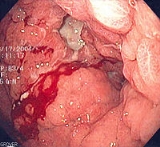
Stomach cancer
Overview
Stomach
The stomach is a muscular, hollow, dilated part of the alimentary canal which functions as an important organ of the digestive tract in some animals, including vertebrates, echinoderms, insects , and molluscs. It is involved in the second phase of digestion, following mastication .The stomach is...
and may spread throughout the stomach and to other organs
Metastasis
Metastasis, or metastatic disease , is the spread of a disease from one organ or part to another non-adjacent organ or part. It was previously thought that only malignant tumor cells and infections have the capacity to metastasize; however, this is being reconsidered due to new research...
; particularly the esophagus
Esophagus
The esophagus is an organ in vertebrates which consists of a muscular tube through which food passes from the pharynx to the stomach. During swallowing, food passes from the mouth through the pharynx into the esophagus and travels via peristalsis to the stomach...
, lungs, lymph nodes, and the liver
Liver
The liver is a vital organ present in vertebrates and some other animals. It has a wide range of functions, including detoxification, protein synthesis, and production of biochemicals necessary for digestion...
. Stomach cancer causes about 800,000 deaths worldwide per year.
Stomach cancer is often asymptomatic
Asymptomatic
In medicine, a disease is considered asymptomatic if a patient is a carrier for a disease or infection but experiences no symptoms. A condition might be asymptomatic if it fails to show the noticeable symptoms with which it is usually associated. Asymptomatic infections are also called subclinical...
or causes only nonspecific symptoms in its early stages. By the time symptoms occur, the cancer has often reached an advanced stage (see below), one of the main reasons for its poor prognosis.
Stomach cancer can cause the following signs and symptoms:
Stage 1 (Early)
- Indigestion or a burning sensation (heartburnHeartburnHeartburn, also known as pyrosis or acid indigestion is a burning sensation in the chest, just behind the breastbone or in the epigastrium...
) - Loss of appetite, especially for meat
- Abdominal discomfortAbdominal painAbdominal pain can be one of the symptoms associated with transient disorders or serious disease. Making a definitive diagnosis of the cause of abdominal pain can be difficult, because many diseases can result in this symptom. Abdominal pain is a common problem...
or irritation
Stage 2 (Middle)
- WeaknessWeaknessWeakness is a symptom represented, medically, by a number of different conditions, including: lack of muscle strength, malaise, dizziness, or fatigue. The causes are many and can be divided into conditions that have true or perceived muscle weakness. True muscle weakness is a primary symptom of a...
and fatigueFatigue (physical)Fatigue is a state of awareness describing a range of afflictions, usually associated with physical and/or mental weakness, though varying from a general state of lethargy to a specific work-induced burning sensation within one's muscles... - BloatingBloatingBloating is any abnormal general swelling, or increase in diameter of the abdominal area. As a symptom, the patient feels a full and tight abdomen, which may cause abdominal pain sometimes accompanied by increased borborygmus or more seriously the total lack of borborygmus.-Symptoms:The most common...
of the stomach, usually after meals
Stage 3 (Late)
- Abdominal painAbdominal painAbdominal pain can be one of the symptoms associated with transient disorders or serious disease. Making a definitive diagnosis of the cause of abdominal pain can be difficult, because many diseases can result in this symptom. Abdominal pain is a common problem...
in the upper abdomen - NauseaNauseaNausea , is a sensation of unease and discomfort in the upper stomach with an involuntary urge to vomit. It often, but not always, precedes vomiting...
and occasional vomitingVomitingVomiting is the forceful expulsion of the contents of one's stomach through the mouth and sometimes the nose... - DiarrheaDiarrheaDiarrhea , also spelled diarrhoea, is the condition of having three or more loose or liquid bowel movements per day. It is a common cause of death in developing countries and the second most common cause of infant deaths worldwide. The loss of fluids through diarrhea can cause dehydration and...
or constipationConstipationConstipation refers to bowel movements that are infrequent or hard to pass. Constipation is a common cause of painful defecation... - Weight lossWeight lossWeight loss, in the context of medicine, health or physical fitness, is a reduction of the total body mass, due to a mean loss of fluid, body fat or adipose tissue and/or lean mass, namely bone mineral deposits, muscle, tendon and other connective tissue...
- BleedingBleedingBleeding, technically known as hemorrhaging or haemorrhaging is the loss of blood or blood escape from the circulatory system...
(vomiting blood or having blood in the stool) which will appear as black.
Unanswered Questions

